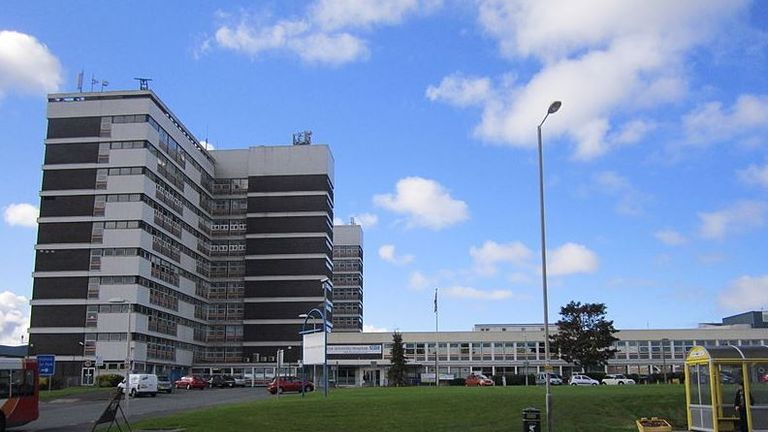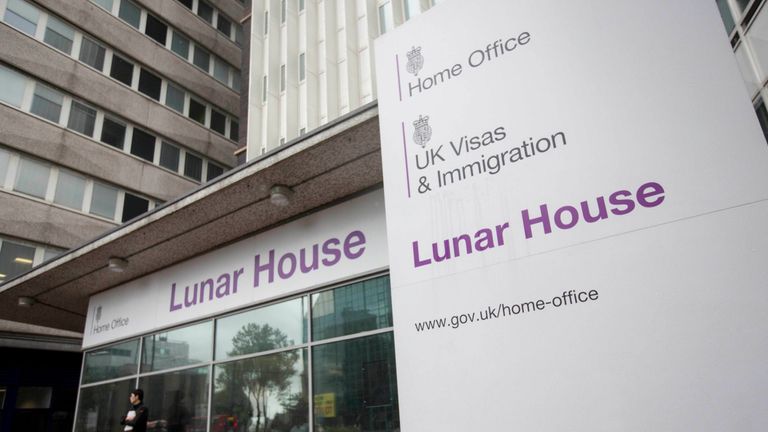Trainee GP fears deportation after 18 years in UK
Mu-Chun Chiang has lived in the UK since 2006, and before that lived with her parents in Glasgow between 1997 and 2002.
Monday 30 September 2019 22:41, UK
A trainee doctor who has spent more than half her life in the UK has received a letter giving her a week to leave the country or face deportation.
Mu-Chun Chiang is seeking legal advice, but the Home Office insists she does not face being kicked out of the country and that it is "discussing the options" with her.
But the 27-year-old says she has received no assurances over her future since being informed that she must leave.
Ms Chiang has lived in the UK since 2006, when she moved to Cambridge from Taiwan to study, and before that had lived with her parents in Glasgow between 1997 and 2002.
Speaking in a strong Scottish accent, she told Sky News: "When I went back to Taiwan, it was a different environment and a little bit tricky for me - I was quite young and really wanted to get back to the UK.
"My family is in Taiwan, but I'm more in tune with what's going on in the UK, it feels like I'm at home. I enjoy helping people, always enjoyed biology and science at school, and since pursuing that path have never looked back."
After completing her GCSEs and A-levels at The Leys school in Cambridge, she moved to the University of Liverpool to gain a medical degree and then obtained an MA at The Liverpool School of Tropical Medicine.
She completed a two-year foundation programme at Cheltenham General Hospital and Gloucester Royal Hospital, and recently moved back to Liverpool for GP training, while also working shifts at Aintree University Hospital.
But those plans are in tatters because of a misunderstanding over her visa application.
She had been on a student visa from 2006 until earlier this year, but needed to apply for a working visa to remain.
Her application began in June and included receiving a sponsorship certificate from Health Education England, but the issue that stands to cost her did not emerge until 22 August.
The Home Office set a threshold to prove she was self-supporting, which was to have at least £945 in a bank account during the 90-day period of her application.
While the balance on her current account had fallen below £945, she claims she did have more than this amount in her savings account.
However, she only submitted the current account statements, as she was under the impression that the threshold only needed to be met at the end of each month.
The Home Office rejected her application, but she appealed within days with statements proving her savings account did have enough money in it throughout the 90 days.
Ms Chiang said: "I failed to realise they meant at no point, not even one hour of the day, was my money allowed to drop below the £945. This was a genuine misinterpretation of the rules."
On 27 September, she picked up a letter informing her that she was facing deportation within seven days.
It was dated 19 September and was delivered on 25 September, but Ms Chiang missed it because she was working.
The Home Office says Ms Chiang is not subject to removal proceedings, but she said: "It feels like they are treating me as a criminal. I have had to stop working - I am meant to be on call and my employers are trying to get cover.
"With how the NHS is, I don't know why they won't take into consideration my appeal."
More than 10,000 people have signed a petition calling on the Home Office to reverse its decision, attracting support from fellow doctors in the UK and abroad.
Ms Chiang said: "Never have I really thought of myself as a really valuable asset with the right to stay. But I really enjoy my job, and everybody knows there is a shortage of GPs.
"These sorts of rules from the Home Office need to be revisited - I am meeting a lawyer on Monday to see what my options are, but a lot of doctors will just give up and go home."
In a statement, a Home Office spokesman said: "All visa applications are considered on their individual merits and in line with the immigration rules.
"Ms Chiang did not provide the evidence required to be granted a visa but we are in contact with her and are discussing the options available to her."
Ms Chiang claims she has not received further correspondence from the Home Office.







